- Home
- Marie Treanor
In His Wildest Dreams
In His Wildest Dreams Read online
Every dream can come true…in unexpected ways.
The only time Glenn Brody acted on the waking dreams his mother called second sight, he landed in prison for a crime he didn’t commit. Now he keeps himself grounded in the real world, turning a neglected Scottish mansion into a co-op that gives ex-cons a second chance.
He’s almost managed to ignore the persistent, erotically charged dreams featuring a beautiful, passionate woman—until that woman accosts him in the street to ask for a job.
In hiding from her violent ex, Izzy Ross has made a peaceful life for herself and her young son in the isolated Highland village of Ardknocken. Handsome men with a criminal record aren’t high on her list, but when work dries up, she’s forced to ask Glenn for a menial cleaning job at the big, dusty house.
Their mutual attraction turns all their preconceived notions upside down, and stirs the mansion’s legendary ghost. Attracting the kind of media attention that could force Glenn to make a perilous choice to save the woman he’s grown to love.
Warning: Contains a mansion full of unlikely heroes, liberal and colorful use of Scottish slang, a medieval ghost, and enough hot sex to spice up the chilliest Highland night.
In His Wildest Dreams
Marie Treanor
Dedication
To Linda. Again!
Chapter One
He didn’t look like a laird. He was big and rough, wore tatty, mud-stained jeans and a baggy grey sweater, and he crouched on the roof of the largest outhouse, hammering nails into slates. His thick, too-long brown hair was tied back in a careless ponytail.
As Fiona and Jeremy emerged around the side of the big house into the yard, he lifted his head to face them. For the tiniest instant, he remained perfectly still, then he slid down the roof and dropped lightly to the ground. He still gripped the hammer in one large hand as he walked toward them. Something in his stride reminded Fiona of a caged animal, its violence temporarily controlled but far from tamed. It did things to her libido—until she looked into his watchful, scarred face and remembered, finally, why his name had seemed familiar.
Oh shit! He was holding a hammer, and Jeremy had no idea who he was.
Frozen, Fiona watched Jeremy walk forward to meet him, hand outstretched. “I’m told you’re the laird,” he said jovially.
“I’m Glenn Brody.”
She was right. It was him—Glasgow gangster and reputed hit man, recently released after serving ten years of a murder sentence. And yet G. Brody was listed as the owner of Ardknocken House and estate.
Clearly, the name meant nothing to Jeremy, who’d never had the benefit of working in Scotland. He beamed at the ex-con. “Excellent! My name’s Jeremy Danehurst. I work for a television company called Genuine. This is my colleague, Fiona Marr—whom you may recognize!”
Brody took his time to shift the hammer to his left hand before grasping Jeremy’s in his right for the briefest shake. Then he glanced at Fiona, who felt like a rabbit trapped in headlights. Or staring down the barrel of a hunting rifle. His lips twisted slightly, but no one could have called it a smile. To her relief, he didn’t offer to shake hands with her.
Jeremy said, “Fiona’s going to be fronting a new series we’re doing on haunted houses.”
“Another one?” Brody said sardonically.
“This one’s going to be a bit different,” Jeremy assured him. “We’re looking at historically significant places, bringing genuine background into the story of the haunting. So we’d love to feature Ardknocken House in one of our programmes. You should have had a letter, but we didn’t receive your answer, so I don’t know—”
“I didn’t send any answer,” Brody interrupted. “I understood that would be taken as ‘no’.”
Jeremy laughed easily. He was good at this stuff. But even his southern English ears must have picked up Brody’s accent, by now—hardly public school, or even regionless Scottish like her own. Brody’s was pure Glasgow. Although, admittedly, you could make out the words.
“Mr. Brody,” Jeremy said with an expansive wave toward the weathered grey turrets and stone walls of Ardknocken House. To Fiona, they no longer looked romantic and atmospheric; they seemed as threatening as the man who owned them. “You can’t expect us to give up on such a fabulous opportunity without a second try.”
“Is that why you’re here? Sorry you’ve wasted your time. My answer’s no. Unequivocally. I’ll walk you to your car.”
Somewhere, in prison or out, he’d developed enough social presence to make it impossible for them to stay. Almost like obedient children, she and Jeremy allowed themselves to be shepherded around the side of the house. From inside, a muffled cacophony of rock music and machinery drifted through the stone or from open windows. Fiona could hear a television too.
“Can I ask why?” Jeremy hazarded, still not giving up.
Brody shrugged. “Too busy. And besides, the house isn’t haunted.”
“We wouldn’t get in your way,” Jeremy promised.
Brody looked at him. “Yes,” he said, “you would.”
Even Jeremy blinked rapidly at that, a rare sign of fluster.
They rounded the corner to the front of the house, where they’d parked the car. Outside the impressive—and now open—front door, a young woman and a wiry, middle-aged man were arguing, although they shut up when they caught sight of “the laird” and his visitors.
“Good-bye,” Brody said with finality. He stood still as they walked on to the car. Fiona felt only relief.
But Jeremy, bloody Jeremy, paused with his fingers already on the door handle. He turned back and said over his shoulder, “You do understand that we’d pay you?”
It was, she supposed, inspiration. A place like this must cost a fortune to keep up. And even Brody, who didn’t look exactly tempted, gazed at him consideringly before he asked, “How much?”
Fiona gaped when the number rolled off Jeremy’s lips. Twice what they’d agreed to pay even the most mercenary of participants so far.
“Fuck,” said the wiry man on the doorstep with undisguised admiration.
Brody’s expression didn’t change. Then: “I’ll think about it,” he said abruptly, and turning on his heel, he walked up the steps past the two people at the door and disappeared inside.
“What’s to think about?” Chrissy demanded, following him into the house. “Money like that would solve more than a few immediate problems!”
Glenn could hear the car’s engine starting up outside. He shrugged but kept walking toward the dark oak staircase. “Whether or not we want them here. They’re making TV programmes about haunted houses, so they’d be under our feet day and night.”
“Meeting tonight, then?” Chrissy pursued.
Without turning, he could see the pound signs in her eyes. With the TV money, they could buy the new equipment now and still deal with the most necessary of the house repairs. Though she’d have to sell the idea of visitors to more grumpy ex-cons that him.
When he’d first got out of prison, Glenn couldn’t bear being indoors, even in the pouring rain or howling gales. But here at Ardknocken, it never felt like being enclosed. The house was too big, too gracious. Light poured in its big, Victorian windows, flooded all the way down the main stairwell from the huge skylight in the roof. It was why he’d first let others stay here, because even if you heard their voices, you never needed to see their owners, let alone walk into them. Unless you chose.
He chose now to leave the rest of the outhouse roof until tomorrow. Instead, he felt the urge to play, solely for his own amusement. And making these choices for himself was still a ple
asing novelty. He leapt up the stairs two at a time, stretching his legs out, and strode along the landing to the next flight, which he took at equal speed.
At the end of the next hall, he pushed open his bedroom door and went in, swiping up his favourite acoustic guitar as he went. Then he sat cross-legged on his unmade bed, by the window, the guitar resting on his thighs as he gazed out over the rugged landscape to the scattered village and the sea beyond. Farther to the right, the hills loomed tall and ancient, reminding him of his own and everyone else’s tiny place in the hugeness of the world.
He strummed the guitar once, and then he saw her, the woman who’d been haunting his waking visions for months, a fraction of a second before the world altered.
That was different. The tilt into the dream usually happened first. Perhaps it had just been hard to perceive, because in the dream, he was still in bed, just not with the guitar. And it wasn’t this bed or this room.
But the really important thing was, he lay naked, cradled between the bare hips of a woman, pushing slowly and exquisitely inside her. Her long, black hair spilled over the white pillow. Her huge, liquid-brown eyes stared up into his with aching passion as she clung to him, undulating beneath him, massaging him with her strong internal muscles as he moved within her.
He was so struck with her expression, with his effect on her, that it was several moments before he recognized his own state of physical bliss—something he seemed to have no control over. He didn’t choose how or when to move, he just did, sliding in and out of her, arching to bend his head and kiss her beautiful dusk-peaked breasts. She thrust upward, pushing her nipple into his mouth, and he sucked on it, making her moan and writhe. She had such beautiful breasts, full and pert, a perfect fill, surely, even for his big hands. He wanted to try, to see if the hand that caressed her was his, but he was stroking lower down, holding her hips steady, moving her as he fucked her.
He plunged faster now, licking the tiny beads of perspiration from her brow as she moaned and gasped with increasing intensity. Her fingers ran up and down his spine, digging, clutching. Her wet, silken heat surrounding his cock was bliss. He could stay here all day and into the night. Oh yes. Sex. Orgasm.
When the storm broke over her, a smile split her face like sunshine, and yet tears spilled from the corners of her eyes as she writhed and convulsed beneath him. He took her mouth, swallowing her cries, driving into her again and again until, finally—
He sat on his own unmade bed, the guitar barely held in his slack hands.
Glenn squeezed his eyes shut in desperation, but the vision had gone.
Fuck and fuck and fuck! If he had to have dreams like that when he was still bloody awake, could whatever sent them not at least let him finish the job? How could he concentrate on music with a hard-on like this?
Impatiently, he shoved the guitar onto the bed and tried to calm his galloping heart. Although he’d never laid eyes on her in real life—real life just wasn’t that good to him—he’d dreamed of this girl before. So often, in fact, that they could be married. The first time, he’d still been in prison, but since coming here, the dreams had intensified in quality as well as quantity. Usually, he was screwing her, and they both seemed to be having a lot of fun with that, but he never came before he woke up.
Glenn stood up, pacing the length of the room. Fucking dreams. His mother had once told him they were second sight, but Glenn didn’t believe that. He made his own future, for good and ill. Except for the time he’d dreamed of Tommy Grant’s dead body in that bad-taste bathroom. The crime boss had been sprawled fully dressed in his own ridiculously ornate bath tub with his throat cut. Glenn would never have gone anywhere near Tommy’s house that night if it hadn’t been for the dream. But even then, it had only come true because Glenn had made it—he’d put the body in the bath because of the dream.
Anyhow, his chances of ever screwing a girl like the one in this dream were pretty damned remote. In fact his chances of screwing any girl at all weren’t good right now. In a village this size, they all knew who he was, and they all crossed the street to avoid him.
Mostly, he didn’t really mind. The girl in the dream had become an ideal, one that overshadowed real women. An excuse for loneliness, and for avoiding the squalor of pickups and sex that had little more meaning than your own fist.
He stopped his pacing at the window and gazed across at the sandy beach. It called to him as it often did. It was one of the reasons he’d bought this place, ramshackle old money-pit as it was. Grabbing up his waxed raincoat, he strode out of his room and downstairs to the front door, calling for the dog who was, no doubt, scrounging in the kitchen during the cooking lesson that would result in dinner.
The dog—called Screw because of his propensity to guard everything, from Glenn to his own dinner to whatever stick or garden rubbish he took a shine to—was a large, boisterous collie cross. At Glenn’s shout, he came bounding out of the back of the house like a released arrow and danced around Glenn as he strode outside.
Glenn still relished his ability to act on such impulses, to go where he pleased, when he pleased. Freedom.
There was a little harbour in Ardknocken, where a few locals tied up their boats between informal fishing expeditions or trips over to the small isles, or even to Skye in the good weather. A sailing instructor was on Glenn’s list of people to contact before next summer. In the meantime, he contented himself with hurling stones and bits of driftwood for the dog to chase after, and kept walking and walking. When he managed to tire both of them, he’d go up to the village and buy some beer for the evening.
He was aware of the boys for about five minutes before they finally approached him. They were village kids, four of them, maybe sixteen or seventeen years old, still in school uniform as if they’d come straight here without going home to change.
“Hey, mister,” one of them called by way of greeting.
Glenn nodded but didn’t break his stride. The boys sped up, coming closer. The dog chose that moment to dash up to Glenn, depositing the misshapen stick he’d taken a shine to, and then leaping back, tongue lolling, tail wagging.
Glenn bent and picked up the stick.
“Mister, d’you know where we can get some hash?” the same boy asked with bravado. He was tall, skinny, with a shock of red hair.
“Or anything stronger,” the shorter blond boy next to him added and got an elbow in the ribs from his pal.
“So do you?” the redhead persisted.
Glenn sighed. “Aye. I know.” He always knew, because he was still hard-wired to pick up the signs.
“Will you get us some?”
“No.” Glenn threw the stick, and the dog hurtled after it into the sea.
“How not? We’ve got the money.” And the idiot actually took a handful of notes from his pocket, presumably the combined finance of the present group and possibly other kids too.
“Nice going, lads,” Glenn commented. “Why don’t you just chuck it in the sea right away? Saves involving any middle men in your loss.”
Baffled, they all stared at him. “What middle men?” one demanded.
Glenn shrugged. “Cops. Parents.”
“Fuck. You wouldn’t grass us, would you?” came the shocked response.
“I wouldn’t need to. The curtains are twitching up there at the tea room already.”
“Oh shit, put the dosh away,” a darker boy hissed in clear alarm.
The redhead hastily stuffed the notes back in his pocket. “All right,” he said, clearly embarrassed. “Sorry. Somewhere else, then. You’ll get us something good?”
“No,” Glenn said, watching the dog gallop toward him once more, stick protruding from both sides of his mouth. He extracted the stick and turned to face the boys with a curl of his lip. That particular sneer stretched the villainous-looking scar below his left cheek, which should remind them, in case they’d forgotten
, of exactly where he’d come from. “It’s against my parole conditions.”
He threw the stick and strode after the bounding dog to the steps that led up from the beach to one of the village’s three main streets. It was possible that the village busybodies would have seen the kids offering him money and assume he was buying alcohol for them instead of drugs, or perhaps as well as drugs. But he was damned if he’d change his trivial plans because of a bunch of bored kids and nosy adults.
His favoured off-licence was next to the tea shop. He bought two packs of beer and walked back out onto the street. Being used to the disapproving stares of the locals, he didn’t bother to look at the two women and a small boy who stood gossiping outside the tea shop. Or, at least, not beyond the automatic gauging and dismissal of their distance and position and possible threat.
However, once past them, he was surprised to hear a female voice say nervously, “Excuse me, Mr. Brody?”
Surprise made him turn to face her. She stood with her friend in front of the tea shop door. She was young, dark haired and pretty, and a boy of about four or five was trying to tug his hand free of hers. But none of those things were what held him frozen with shock, his blood rushing in his ears, his gaze riveted to the woman’s vital face as all the other circumstances in which he’d seen her flashed through his mind. Naked. She’d usually been naked.
She was the girl from his dream.
Chapter Two
She noticed him on the beach as she sat in the tea shop with Jack and Louise, sipping coffee. Although she’d never spoken to him or even seen him close-up, she knew who he was. Everyone in the village did. Glenn Brody, the Glasgow murderer who’d bought the big house with his ill-gotten gains and now lived in it with several other convict pals. Mrs. Campbell in the post office had set up a petition to persuade him to leave. Izzy didn’t entirely blame her. She certainly didn’t want gangsters and criminals contaminating Ardknocken with their violence. On the other hand, there hadn’t actually been any crime or violence since Brody had moved in there about six months ago. He and his friends kept themselves to themselves for the most part. And he was human enough to play with his dog on the beach.

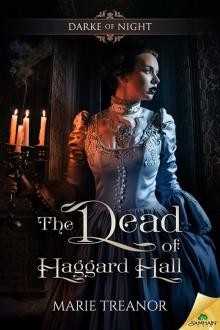 The Dead of Haggard Hall
The Dead of Haggard Hall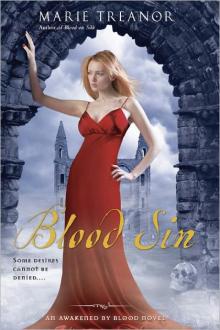 Blood Sin (2)
Blood Sin (2) In Her Secret Fantasy
In Her Secret Fantasy Serafina and the Virtual Man (Book 2 of the Serafina's Series)
Serafina and the Virtual Man (Book 2 of the Serafina's Series)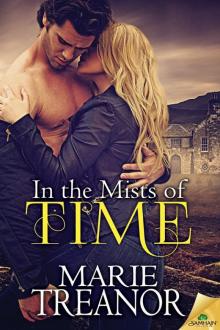 In the Mists of Time
In the Mists of Time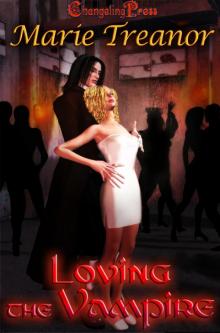 Loving the Vampire
Loving the Vampire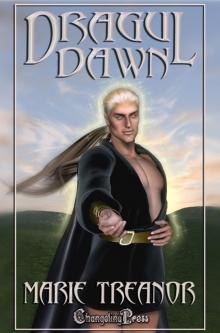 Dragul Dawn
Dragul Dawn Killing Joe
Killing Joe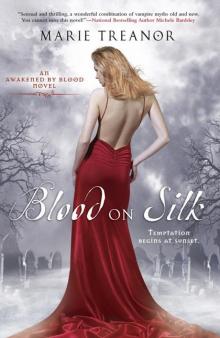 Blood on Silk
Blood on Silk Serafina and the Silent Vampire
Serafina and the Silent Vampire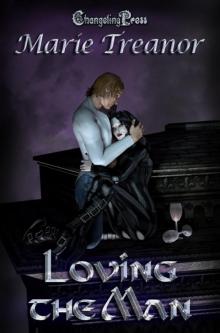 Loving the Man
Loving the Man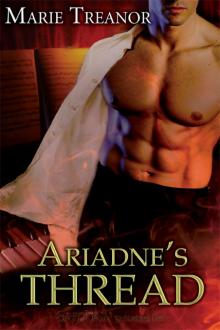 Ariadne's Thread
Ariadne's Thread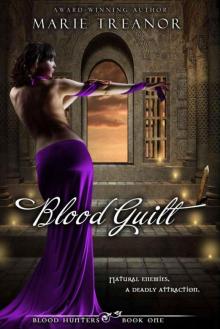 Blood Guilt
Blood Guilt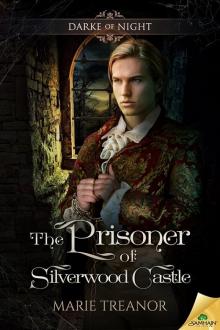 The Prisoner of Silverwood Castle
The Prisoner of Silverwood Castle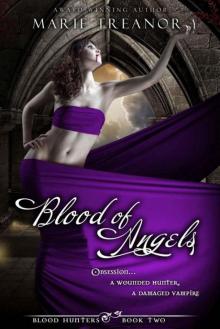 Blood of Angels (Book 2 of the Blood Hunters Series)
Blood of Angels (Book 2 of the Blood Hunters Series)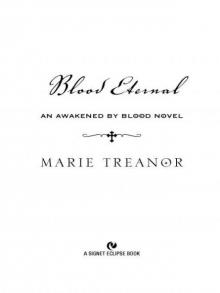 Blood Eternal
Blood Eternal Hunting Karoly
Hunting Karoly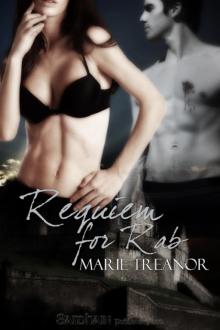 Requiem for Rab
Requiem for Rab In His Wildest Dreams
In His Wildest Dreams